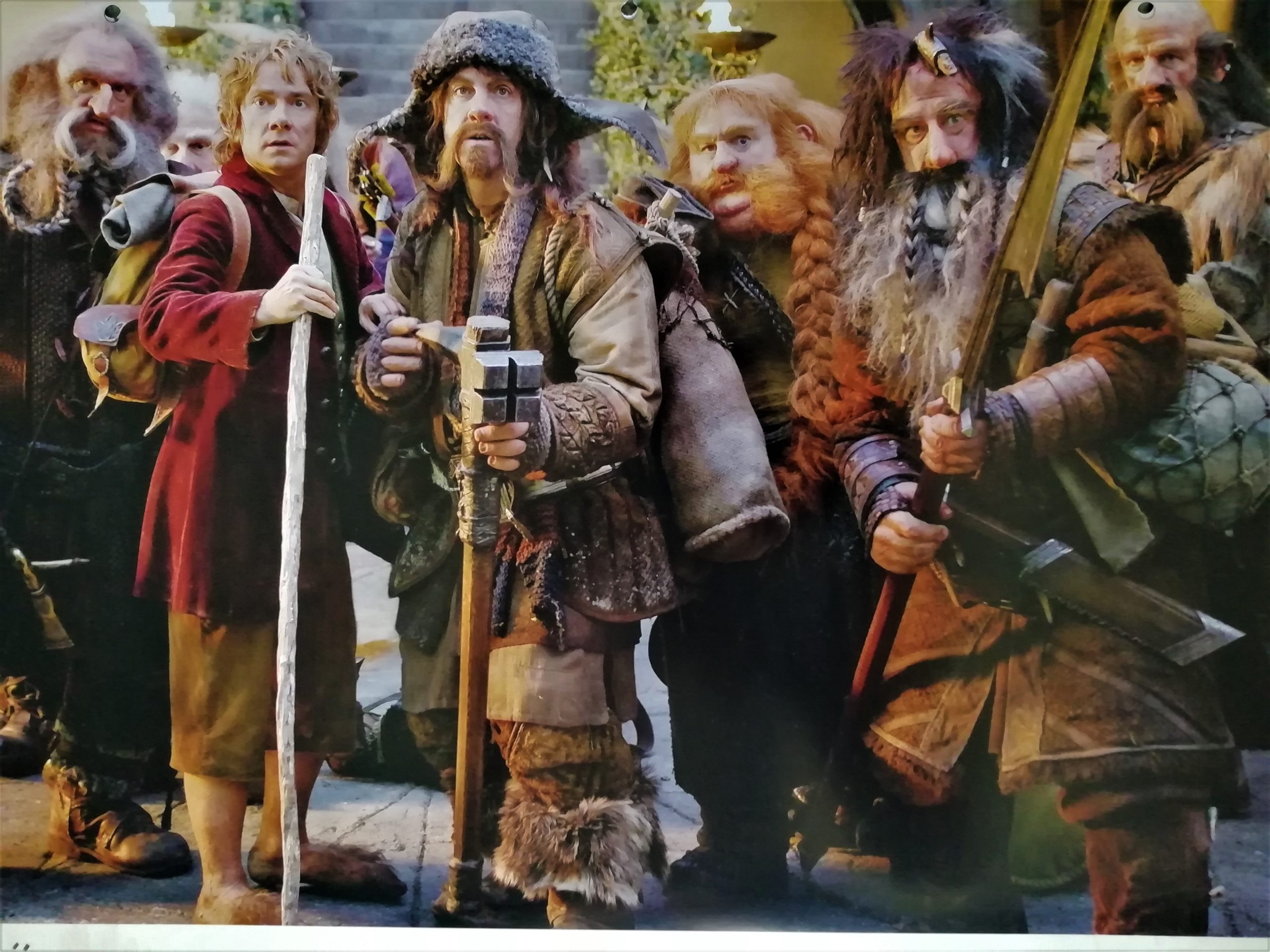The Dwarves are trapped. There is no exit strategy that they can see. The Orcs have surrounded them in spite of Radagast’s semi-successful attempt at drawing them off. They followed him long enough for the Dwarves to escape an immediate onslaught. However, what they are left is cornered. Now, there is no escape possible. It seems the Dwarves will have to face their fate alone.
Gandalf to the rescue
Gandalf: “This way, you fools!”
Thorin: “Come on! Move! Quickly! All of you!”
Bofur: “Come on!”
Thorin: “Go, go, go!”
Gandalf: “Eight, nine, ten.”
Thorin: “Kili! Run!”
And again Gandalf springs up in the nick of time. He has already taken to hiding while the company faced the Orcs alone. They haven’t noticed Gandalf disappearing and when he did they couldn’t figure out where he went. They simply concluded that he must have abandoned them. What Gandalf in reality did is find their escape route, one that no one can see.
Elvish arrowhead
Thorin: “Elves.”
As the company enters the underground cave one by one with Gandalf keeping count on everyone, a horn is heard blowing on the surface. They cannot identify the sound, but an Orc casualty brings with him proof of his killers. The arrowhead is that of Elvish make. As soon as Thorin recognizes it, his comment comes out maddening, angry.
It must be a blow to his pride to know that Elves saved his life. They are the ones capable of taking down a pack of Orcs. Had it been only for the Dwarves, they probably wouldn’t have made it alive.
Right on point
Dwalin: “I cannot see where the pathway leads. Do we follow it or no?”
Bofur: “Follow it of course.”
Gandalf: “I think that would be wise.”
There is a path that leads through the cave. Having no other choice but to follow it, the Dwarves take to it with intrigue. They cannot know where it leads but it is certainly better than facing the surface. Without even directing the company, Gandalf had gotten the Dwarves to tread down a path he would have wanted them to. Therefore, his plan had succeeded.
Magic in the air
Bilbo: “Gandalf. Where are we?”
Gandalf: “You can feel it.”
Bilbo: “Yes. It feels like…Well, like magic.”
Gandalf: “That’s exactly what it is. A very powerful magic.”
As they all near the exit, Bilbo begins to feel something that no Dwarf had noticed. He cannot tell where he is, but he can feel it. There is magic in the air. This magic that Bilbo refers to is one used to protect the secretive path as well as the valley to which it comes out. It is interesting to note how sensible Bilbo is to alterations in the air. He could have sensed something but ignored it or rationalized it as something else.
However, the fact that he feels and denominates it as magic speaks about his character. It says that he still believes in magic, a belief no doubt harbored since he was a child. So here, for the first time in his journey, he has been able to access the child in him. This is not to say that he is acting childish but rather that his once flourishing fantasies and curiosities have not lost their power.
Dormant instincts
They may have been dormant for a long number of years, but now that he encounters genuine magic, he cannot but unlock the same beliefs he once had. Although at first, he seems embarrassed to admit to feeling magic to Gandalf, as Gandalf acknowledges his feeling, Bilbo is reassured in his instincts.
This is exactly what Bilbo had been missing all these years. Having been governed by fear and reason, his instinctual self had been left ignored. Now, he has been given the chance to explore this dormant part of himself. It is wonderful to see how easy he gives into it. It didn’t take much to let his instincts take over reason.
Awestruck
Glóin: “There’s light ahead.”
Gandalf: “The Valley of Imladris. In the common tongue, it’s known by another name.”
Bilbo: “Rivendell.”
Gandalf: “Here lies the Last Homely House East of the Sea.”
And now he has finally reached the place that he as a child was looking for. He appears as though he cannot believe his eyes. Bilbo had heard about Rivendell and wished he could meet the Elves that resided within, but that dream was left to sleep as his other life took over his thought and behavior. Now, that he stands in its presence, it is as if he had been awestruck, like meeting his childhood hero. An unbelievable sight to behold.
Anger and prejudice
Thorin: “This was your plan all along. To seek refuge with our enemy.”
Gandalf: “You have no enemies here, Thorin Oakenshield. The only ill will to be found in this valley is that which you bring yourself.”
Thorin: “You think the Elves will give our quest their blessing? They will try to stop us.”
Gandalf: “Of course they will. But we have questions that need to be answered. If we are to be successful, this will need to be handled with tact. And respect. And no small degree of charm. Which is why you will leave the talking to me.”
It is true that negativity is transferable from person to person as well as from person to a group or place. What Thorin has done is take his anger and need for vengeance out on the people that had nothing to do with the “betrayal”. Lord Elrond and his Elves were nowhere near Erebor when the dragon attacked. However, the mere concept of Elves awakens anger in Thorin, anger that he now brings to this heavenly place. A shame really. Had he the capacity to look beyond his own grudges he would see the beauty that stretches out before him.
Pragmatism and openness
Gandalf is very pragmatic. He knows the dangers of bringing the company to Lord Elrond. As one of the guardians of Middle-Earth, he is capable of opposing the quest entirely, ordering the Dwarves to halt their advance. However, the question pertaining to the deciphering of the map can only be asked of Lord Elrond. He is the only one near enough to help them read the map properly. So, to have their problems solved, they will need to be as delicate and as respectful as humanly possible, something that doesn’t come naturally to Dwarves.
They would rather solve their problems with swords and axes. Which is why it is the most opportune moment for Gandalf to take center stage and do his magic. He will be the representative of the group as well as its spokesperson. Whatever communication there may be between Lord Elrond and the Dwarves, Gandalf will conduct in their name to avoid any possible friction between the two.
Lindir
Lindir: “Mithrandir.”
Gandalf: “Ah, Lindir.”
Thorin: “Stay sharp.”
Lindir: “We heard you had crossed into the Valley.”
Gandalf: “I must speak with Lord Elrond.”
Lindir: “My Lord Elrond is not here.”
Gandalf: “Not here? Where is he?”
As Gandalf and Lindir exchange pleasantries, Thorin warnes his right hand Dwarf Dwalin to stay alert. Thorin is incredibly suspicious and untrusting toward any member of the Elven race, so any communication in which he does not partake and so cannot control, he fears will lead to another betrayal.
Gandalf eyes Lindir suspiciously as he denies Lord Elrond’s presence in Rivendell. The fact is that Lord Elrond does not presently find himself in his home, but as Gandalf asks him where he is to be found, Lindir does not answer. Fortunately, the horn sounds to announce Lord Elrond’s return.
Lindir appears uncomfortable as the horn sounds and Gandalf receives an immediate answer to his question. Lindir was probably instructed to hold Lord Elrond’s location secret from anyone inquiring.
Surrounded
Thorin: “Close ranks!”
Elrond: “Gandalf.”
Gandalf: “Lord Elrond. My friend. Where have you been?”
Elrond: “We’ve been hunting a pack of Orcs that came up from the South. We slew a number near the Hidden Pass. Strange for Orcs to come so close to our borders. Something or someone has drawn them near.”
Gandalf: “That may have been us.”
Lord Elrond and his cavalry surge onto the plateau where the company is gathered. The Elves on horses surround the company with Thorin ordering them to gather tightly, raising their weapons. Bilbo’s expression of fear reflects that of the other members of the company.
However, he also does not know what is happening and what this current situation can result in. He is altogether unusable in any possible attempt on the Elves. The other Dwarves, aside from fear, show spite and anger at this new development, not liking this feeling of being surrounded by their “enemy”.
Lord Elrond reveals himself and his Elves to have been the ones to slay the Orcs that attacked the company. Gandalf admits that he and the company were probably to blame for the sudden appearance of Orcs that close to Rivendell.
A cold reception
Elrond: “Welcome Thorin son of Thráin.”
Thorin: “I do not believe we have met.”
Elrond: “You have your grandfather’s bearing. I knew Thrór when he ruled Under the Mountain.”
Thorin: “Indeed? He made no mention of you.”
Lord Elrond welcomes Thorin in the most respectful way possible. Thorin, on the other hand, is extremely guarded. Even in a sentence as neutral as his response to Elrond’s greeting, there is interpretation value behind it. As Thorin eyes Elrond there can be no doubt of his prejudice against all Elves. He is most suspicious of what this Elf’s words mean behind their coat of pleasantness. An ulterior motive must be lurking somewhere beneath the surface.
In his attempt to provide information and therefore familiarity with his forefathers, Lord Elrond’s words are met with contempt. With his arms crossed across his chest, Thorin is more than certain of not wanting anything to do with the Elf.
Immature
The fact that Thrór had never mentioned Lord Elrond as a friend or acquaintance, provides Thorin with enough reason to not engage in this conversation further which is why he crudely dismisses Lord Elrond’s attempt at amicability.
A sad exchange to see. It is one thing for Thorin to hold grudges, anger, and betrayal for himself. It is a completely different notion to use it plainly against a person who doesn’t deserve it. Lord Elrond is not at fault that Thorin is so wrapped in rage.
But for Thorin to make it so obvious in what would in every other situation be a polite exchange of pleasantries can only be characterized as immature. He acts in a way a stubborn child would when he doesn’t get what he wants. A very disappointing trait in a soon to be king.
An invitation
Elrond speaks in Elvish.
Glóin: “What is he saying? Does he offer us insult?”
Gandalf: “No, Master Glóin, he’s offering you food.”
Glóin: “Well, in that case, lead on.”
Bofur: “Hey. Come on.”
Lord Elrond’s ominous words resonate with great seriousness. With the Dwarves not being able to understand Elvish, and their own opinion of the race, they can only assume he is saying something to offend them or something in any way negative.
Thankfully, Gandalf is there to reassure them what Lord Elrond’s words actually mean. To an offering of food, no Dwarf can never say no, apparently not even to their “enemy”, which points to there being wiggle room in their otherwise very stubborn outlook.
Follow me to my next post.
Photo credit to Der Hobbit Broschur XL 2020 from Athesia Kalenderverlag GmbH





